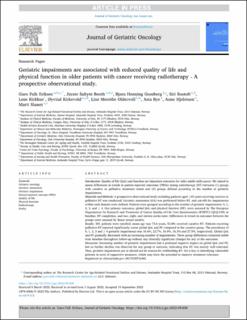Geriatric impairments are associated with reduced quality of life and physical function in older patients with cancer receiving radiotherapy - A prospective observational study
Eriksen, Guro Falk; Saltyte Benth, Jurate; Grønberg, Bjørn Henning; Rostoft, Siri; Kirkhus, Lene; Kirkevold, Øyvind; Oldervoll, Line Merethe; Bye, Asta; Hjelstuen, Anne Kristine; Jordhøy, Marit Slaaen
Journal article, Peer reviewed
Published version
Permanent lenke
https://hdl.handle.net/11250/3046705Utgivelsesdato
2022Metadata
Vis full innførselSamlinger
Originalversjon
10.1016/j.jgo.2022.09.008Sammendrag
Introduction: Quality of life (QoL) and function are important outcomes for older adults with cancer. We aimed to assess differences in trends in patient-reported outcomes (PROs) during radiotherapy (RT) between (1) groups with curative or palliative treatment intent and (2) groups defined according to the number of geriatric impairments. Materials and methods: A prospective observational study including patients aged ≥65 years receiving curative or palliative RT was conducted. Geriatric assessment (GA) was performed before RT, and cut-offs for impairments within each domain were defined. Patients were grouped according to the number of geriatric impairments: 0, 1, 2, 3, and ≥ 4. Our primary outcomes, global QoL and physical function (PF), were assessed by The European Organisation for Research and Treatment of Cancer Quality-of-Life Core Questionnaire (EORTC) (QLQ-C30) at baseline, RT completion, and two, eight, and sixteen weeks later. Differences in trends in outcomes between the groups were assessed by linear mixed models. Results: 301 patients were enrolled, mean age was 73.6 years, 53.8% received curative RT. Patients receiving palliative RT reported significantly worse global QoL and PF compared to the curative group. The prevalence of 0, 1, 2, 3 and ≥ 4 geriatric impairments was 16.6%, 22.7%, 16.9%, 16.3% and 27.5%, respectively. Global QoL and PF gradually decreased with an increasing number of impairments. These group differences remained stable from baseline throughout follow-up without any clinically significant changes for any of the outcomes. Discussion: Increasing number of geriatric impairments had a profound negative impact on global QoL and PF, but no further decline was observed for any group or outcome, indicating that RT was mainly well tolerated. Thus, geriatric impairments per se should not be reasons for withholding RT. GA is key to identifying vulnerable patients in need of supportive measures, which may have the potential to improve treatment tolerance.

